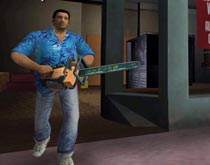Retro: M-for Mature?
 In 2003 – that’s pre-GamerDad.com folks – I wrote this peice for publication at a website that sadly went out of business. The rights came back to me and I used it as part of the foundation at GamerDad. Shows you where my mind was at before all of this stuff began.
In 2003 – that’s pre-GamerDad.com folks – I wrote this peice for publication at a website that sadly went out of business. The rights came back to me and I used it as part of the foundation at GamerDad. Shows you where my mind was at before all of this stuff began.
by Andrew S. Bub
Conflict – action – violence – gore. These are often the essence of drama and are found equally in all art forms. Throughout history the use of these elements has garnered scrutiny and criticism from masses of people who, while well-meaning, fail to truly understand the media that they are quick to criticize. From childhood we all can remember rushing to form a ring, and likely a chant, around two or more combatants in the schoolyard. The thrill of watching a fattened lip form or a bloody nose gush was something we couldn’t deny. This is not necessarily a male thing, a female thing, a child thing, or an adult thing¢ but it is a human thing. Literature, sport, art, sculpture, film, media, and video games all contain, in many cases must contain these elements, or they lose their impact. But those unfamiliar or disinterested in that particular art form see no reason to defend it, much less try and understand it.
Gaming has seemed immune from this scrutiny. Sure there was Senator Lieberman (D-Connecticut) and his anti- Mortal Kombat crusade here, an unflattering news article there, but gaming, while lucrative, has enjoyed a very low-profile. Until recently that is. The video game world, and the real world was shaken profoundly by a singular tragedy. The events that occurred in Columbine came as a shock to everyone. This includes parents, kids, teachers, lawmakers, Hollywood, comic book writers/artists, and even action gamers. What made it worse was how quickly the media focussed not on the perpetrators, but on their fascination with Hitler, their ready access to guns, their parents, and on video games like Doom and Quake. Never, it seemed, on the boys themselves.
This is due to a complete misunderstanding of what goes through a ‘normal’ persons mind as they frag (aliens or the guy next door) in a game, due to equal parts shoddy journalism (that paints a hazy, biased, picture of what gaming is all about) and bad pop-psychology. In fact, according to an article from 2000 found in Salon’s technology section, entitled ‘The Shooters and the Shrinks’: “Results suggest that aggression in the context of a video game discharges children’s aggressive impulses in a socially acceptable way, leaving the children less defensive and more assertive.” Such findings fly in the face of the irresponsible journalism we’ve been seeing. Rarely if ever is a gaming expert interviewed for a counter-point during such reports. And claims, of which I saw multiple times, that “most fans of violent games don’t become homicidal” is misleading. “Most” fans of gaming don’t become homicidal? How about this? All but two fans of violent games do not become homicidal. And the two I’m thinking of, or even the handful you could also connect tenuously to gaming, all had other “excuses” for their rampages. Poverty, hatre, victimization, gun culture, abuse, or even God and religion can be a stimulus to a mind sufficiently warped.

Soldier of Fortune from Activision
A broken person needs only a single straw to break the dam to insanity. For Mark Chapman (who murdered John Lennon) it was the Catcher in the Rye. For Hinkley (who shot Reagan) it was the film Taxi Driver. Countless examples can be laid at the feet of the Holy Bible, and other religious texts. A movie, game, or book doesn’t cause societies ills, but it is a really easy target for the morally arrogant, the quick to judge, and those seeking a fast PR boost based solely on ignorance and fear.
I am not arguing that violent media does not adversely affect impressionable minds of any age. But media cannot be censored to protect society from those that are already a few missions short of an add-on. Children, especially, should be restricted from viewing, or playing, with toys that are by nature disturbing. Parents need to be educated that games, particularly PC games, are not intended for the young. Such restriction must take place in the home. Any other way skirts the fine line between freedom and censorship.

GTA, the most mature games ever, in both senses of the word.
Part of the problem is the rating system, I’d argue. M for Mature? Really? Look at the games that get this rating. DOA Beach Volleyball or Postal 2. What about Grand Theft Auto III? Ok, that one is Mature in execution. Violent content, in all media, is just easier to take, when the story is deep, the cause just, even if the player as the good guy. In Postal you play a crazy person out to shoot innocents, in Carmageddon you run down granny for points¢ Even anti-hero movies like Deathwish, featured characters more sympathetic than Blood’s Caleb. Part of the reason violent games are hard to defend is that the situation is so childish in most action games; it doesn’t look aimed at adults at all. But a violent game with a story, with a world, with a purpose beyond the carnage is truly Mature.
Regardless of this difficult to defend position, the truth is, especially on the PC front, most games are sold to people in the age range of 25-40. Games are prohibitively expensive, especially given the quick technology turn-around of the PC market. To stay current requires money that the average teen just doesn’t have. One problem is a lot of teens do have it, how a teen can stay current, play these games, and not have parents that are aware of it is beyond me and my memory of the pittance my parents called ‘allowance’. Obviously, especially where children are concerned, one must first ask: Why does the government, the industry, society, and retailers need to get involved when it is obviously the parents concern primarily? It’s a good question, and the reason why is because too many parents don’t get involved. An action game touting anti-social behavior and realistic sex or violence will always attract teens, seem aimed at teens, in much the same way mature films do, but ultimately the parents are the only ones that can protect children from their interests. Laws and even industry self-censorship, whatever form it takes cannot effectively manage this. Some people want to make the ESRB rating larger and ‘inform’ the public what these rating mean why? Does a name like Postal, or Blood really need explaining? What part of “Rated: Mature” are people confused about exactly?





June 4th, 2008 at 9:01 am
Nice article, GamerDad! It is interesting with all of the ‘studies’ done in the past 5 years, much of what you cite there is repeated in the research presented recently in ‘Grand Theft Childhood’.
It is interesting in that book that the authors state that it might be more of a problem playing a T-rated game where you shoot people and there is no blood or realistic action, just dead bodies that disappear, as opposed to a game like Soldier of Fortune 2 where you see someone screaming with blood pumping from their severed leg or whatever. That disconnection from the consequences of their actions might be more of a problem than the gory imagery in terms of impact.
June 4th, 2008 at 11:49 am
When exactly did the major consoles decide no on AO?
June 4th, 2008 at 2:52 pm
It was a commercial thing – AO was equated with ‘video game pr0n’ and therefore banned at retail.
June 9th, 2008 at 8:04 pm
Out of morbid curiosity how do you rationally defend freedom and attack censorship? Where do you draw the line? I haven’t really taken a view on this yet, but it seems the popular thing to attack censorship and defend freedom at all cost. Isn’t the condemnation of murder and rape a censorship of actions? Again, I’m not saying I’m for censorship (or murder) but it is so easy to fall into to egoism that I would like to hear some well-thought-out opinions on it.
June 10th, 2008 at 8:00 am
Words, ideas and actions are different. Saying the world would be better is X were true is one thing, actively inciting others to use destructive means to make it happen is another, and the acts of destruction are another still.
June 10th, 2008 at 10:57 am
What are your views on hate speech laws and slander? Do people deserve the right to advocate criminal violence against homosexuals or feminists or Christians or to lie about individuals? Obviously our government supports some censorship in favor of a few select minorities, but the question remains: do all ideas — even the truly evil ones — deserve protection from censorship?
For a long time America thought they didn’t and the courts kept a number of pornographic works (The Tropic of Cancer and a few of Freud’s books) out of the country by obscenity laws. The popular opinion on censorship is of course against it now, but where does the responsibility of the person end and that of the government begin?
Preferably people would be responsible enough that pornography or sadism would never even enter society, but that is a lost cause. The question is now, does the government have the duty to protect pornography and sadism under “free speech” or does it
(and the citizenry) have a moral gauge with which to legally condemn it.
June 10th, 2008 at 1:24 pm
I am strongly opposed to ‘hate speech’ laws, as I believe that they are very much like the incursions into personal life made in the name of ‘patriotism’ under Bush – they are supposed to help quell the environment created by associating an individual with the stereotypical and negative characteristics of a protected class. But that isn’t what they do – they are used regularly by people with political agendas to forward their own ideas.
I believe that all artistic ideas deserve protection, whether it is James Joyce (yes, banned), Maplethorpe, or whatever.
As for what should *not* be protected … I’m pretty good with the ‘direct harm’ stuff like slander and libel, as well as directly inciting harm against others (yelling fire, inciting riots, whatever). But I think the burden of proof needs to be pretty high.